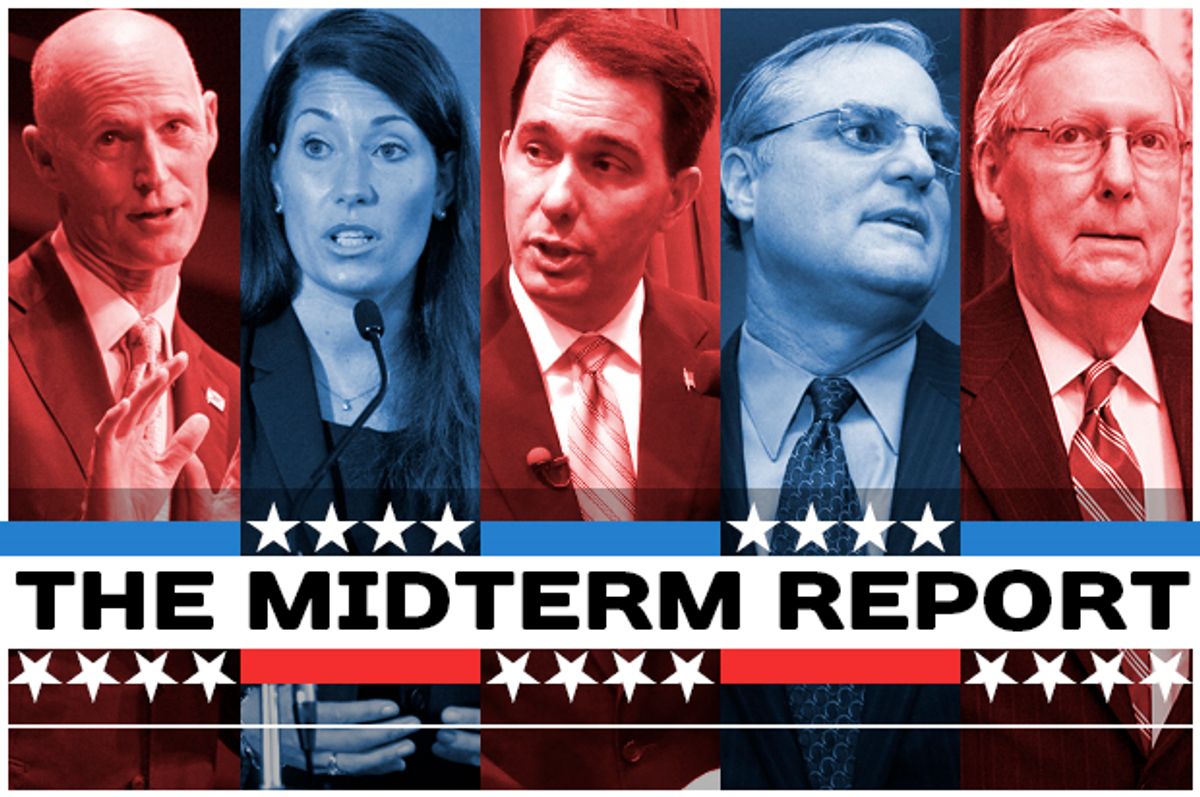Until this March, Democratic Sen. Mark Udall of Colorado was on a glide path to re-election. The freshman had failed to draw a top-tier challenger, and his likely GOP opponent was Ken Buck, whose crude sexism and hardline conservatism doomed his 2010 Senate campaign. But then Congressman Cory Gardner – a Tea Party conservative with better media training – reversed his decision not to challenge Udall, making a relatively late entry into the race and convincing Buck to instead seek Gardner’s congressional seat. Every poll since has shown a single-digit race between Udall and Gardner.
Most recent polls have given Gardner a tiny edge; RealClearPolitics’ polling average finds the Republican up by 1.4 points. Although that’s down from a slightly larger lead earlier this month, Gardner’s apparent advantage has many Democrats worried. But while the razor-thin closeness of the contest indicates that it could go either way, there’s ample reason to believe that recent surveys may overstate Gardner’s strength.
Look no further than recent electoral history in Colorado, where polls have consistently underestimated Democratic performance on Election Day. In 2012, RealClearPolitics’ final polling average in the state gave President Obama a slight 1.5 point edge over Mitt Romney; Obama won the state by 5.4 points. Similarly, 2010 polls suggested that Democrat John Hickenlooper was headed for narrow win in the gubernatorial race, with RealClearPolitics showing Hickenlooper leading by 4 points. Hickenlooper won by nearly 14 points.
Udall can find even more solace in the data from Colorado’s 2010 Senate race between Democratic Sen. Michael Bennet and Buck. Most polls during the cycle showed Buck leading; the final RealClearPolitics average gave the GOPer a three point lead. But higher-than-expected turnout – particularly among Latinos – propelled Bennet to a one point victory.
Could 2014 witness a repeat? It may well. Not only did Colorado’s legislature last year buck national trends by making it easier to vote with the passage of same-day registration, but this will be the first year that the state will mail every registered voter a ballot. The all-mail model is likely to boost turnout among voters who typically drop off in midterm elections. Washington State also uses the model, which was crucial in putting Democratic Sen. Patty Murray over the top in 2010. On Election Day, RealClearPolitics gave Murray just a 0.3 point lead over GOP challenger Dino Rossi, but Murray managed to score a 3.8 point win.
For Democrats anxious about their prospects for retaining Senate control, it would obviously be far more comforting if surveys showed Udall with a clear edge in the race. But a statistically insignificant Gardner lead shouldn’t be cause for panic.
In other midterm news:
- Senate Republican Leader Mitch McConnell of Kentucky and Democratic challenger Alison Lundergan Grimes faced off in their only debate of the 2014 cycle last night, and both candidates brought their knives out. Assailing McConnell as the face of Washington gridlock, Grimes also went after the 30-year incumbent for “consistently voting to keep Kentucky poor.” McConnell, meanwhile, attacked Grimes as an inexperienced liberal. While McConnell’s strenuous attempts to differentiate Kentucky’s popular Obamacare exchange, Kynect, from Obamacare itself were nothing short of awkward, Grimes’ continued refusal in the debate to say whether she voted for President Obama in 2012 will likely grab the most attention.
- Underscoring his status as an unapologetic progressive populist, South Dakota Democratic Senate candidate Rick Weiland is blasting purveyors of the conventional wisdom that Democrats must run milquetoast, centrist campaigns to win in tough states. “The national party has this view that in states like South Dakota you’ve got to run in the center or you can’t win,” Weiland tells the New York Times’ Jonathan Martin. “And you know what: They don’t know South Dakota.” The most recent poll in the race shows Weiland trailing Republican Mike Rounds by just four points, 33 to 37 percent, with independent Larry Pressler garnering 23 percent support. Rounds had long been seen as the prohibitive favorite, but he’s been dogged by questions surrounding a visa scandal engulfing his former gubernatorial administration.
- A new report from the Topeka Capital-Journal won’t help embattled Republican Sen. Pat Roberts of Kansas. The senator, who faces a surprisingly strong challenge from independent Greg Orman, has attended just one-third of Agriculture Committee hearings since 2000. Given that Roberts is vulnerable largely because of the perception that he’s lost touch with the state and its interests, the news seems likely to reinforce the senator’s image problem. A Public Policy Polling survey released Monday showed Orman with a 44 to 41 percent lead over Roberts.

Shares